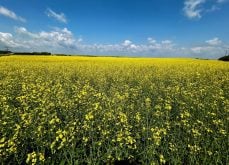The U.S. Environmental Protection Agency is close to approving a pathway for canola oil to be used in the burgeoning renewable diesel sector, says an industry official.
“We could see a proposed rule as early as this month and a final rule as early as July of this year,” said Chris Vervaet, executive director of the Canadian Oilseed Processors Association.
Those are the dates that have been announced by the EPA, but he stressed they are not set in stone.
“It’s great and encouraging to see it on the agenda,” he said.
Read Also

Powdery mildew can be combine fire risk
Dust from powdery mildew can cause fires in combines.
“It really is good news for the entire canola industry.”
COPA estimates that 6.5 million tonnes of U.S. and Canadian canola could be used in North American biodiesel and renewable diesel production by 2030, up from 1.8 million tonnes today.
Canola oil is approved as a biodiesel feedstock in the U.S. but not yet for renewable diesel.
Most of that growth in the biofuel sector is expected to come from renewable diesel.
The U.S. National Biodiesel Board is forecasting 22.6 billion litres of new annual renewable diesel production capacity by 2024, in addition to today’s 3.7 billion litres.
“The capacity buildout for renewable diesel in the United States has been nothing short of amazing,” said Vervaet.
To put it in perspective, the NBB forecast calls for total renewable diesel capacity amounting to nearly three times the existing biodiesel capacity in the U.S. in just three years.
Fred Ghatala, director of carbon and sustainability with Advanced Biofuels Canada, said that is why it is critical to get the EPA approval.
“The sooner the better as it’s obvious there is a race to (ramp) up renewable diesel production,” he said.
He wants to see some canola-based Canadian renewable diesel projects competing in that race.
“The sooner that a canola renewable diesel pathway is officially greenlit by EPA, it removes an amount of project risk and will help our buildout progress,” said Ghatala.
There is strong north-south trade in biofuels and a plant would be far more viable if it could access both the U.S. and Canadian markets.
Some renewable diesel projects have already been announced in Canada.
Imperial is building a plant next to its Strathcona, Alta., refinery that will be capable of producing more than one billion litres per year from locally grown feedstocks.
Covenant Energy Ltd. is constructing a $500 million facility in southern Saskatchewan with an annual capacity of 300 to 325 million litres per year.
Federated Co-operatives Ltd. is planning to build a $1 billion plant in Regina that will be operational by 2027.
Cresta Fund Management is converting an idled oil refinery in Newfoundland and Labrador into a renewable diesel and aviation fuel plant.
More plans could be unveiled when Natural Resources Canada announces the recipients of its $1.5 billion Clean Fuels Fund in the coming months.
Vervaet said it is paramount that Canada’s Clean Fuel Regulations that are still under development are designed in a manner that creates a market for renewable diesel in Canada.
He said there are still some outstanding issues about getting full sustainability recognition for canola oil and other crop-based feedstocks.
“We still have some questions there that are left unaddressed,” he said.
The hope is that Canada’s canola crushers will soon be providing oil for renewable diesel plants on both sides of the border if governments get things right.
“It really (should) create a lot of opportunities for the crushers but (also) for the entire value chain here in Canada,” said Vervaet.


















